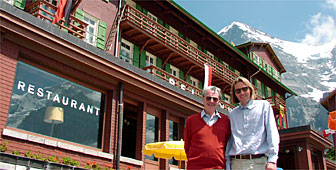Hotels offer grace, comfort below glacial crags

If the walls could talk, the Hotel Bellevue-Des Alpes on the Kleine Scheidegg Pass would have stories to tell. The Bellevue and its neighbour hotel on Wengern Alp have sheltered illustrious guests from Lord Byron to Sir Leslie Stephen and Marx and Engels. The same family has owned the two hotels for five generations.
On a tour of Switzerland in 1816, Byron travelled from the Lauterbrunnen Valley in the Bernese Oberland to Wengern Alp, which lies within a stone’s throw of the glaciers cascading from the Eiger and Jungfrau peaks. It was here that he conceived his poem, “Manfred”:
“Ye toppling crags of ice –
Ye avalanches, whom a breath draws down
In mountainous o’erwhelming, come and
Crush me!”
A night on Wengern Alp was less inspiring, apparently, for Byron, who had little to say afterward. “[He] had to stay with the peasants looking after their cows in summer. The accommodation was very primitive,” explains Kaspar von Almen, descendant of an innkeeper who was Byron’s contemporary.
“They had to sleep on hay like the peasants, with the smoke of the fire, with the smell of the cows and the nocturnal noises peasants make.”
Within a few years of Byron’s visit, a small inn was erected on Wengern Alp, followed by another on the Kleine Scheidegg. The man who opened the inns was Christen Seiler, von Almen’s forefather.
“He was a very tough and big man. He was the best wrestler in the Bernese Oberland and he looked it,” von Almen says. “He had a natural respect from the peasants owning the land on both sides of the pass. When Christen Seiler wanted something, he usually got it.”
Seiler soon welcomed the British elite to his inns, among them men destined to become mountaineering legends. It was from the Kleine Scheidegg that the Irish jockey, Charles Barrington, set off with his Swiss guides to make the first ascent of the Eiger. Sir Leslie Stephen stayed on Wengern Alp before attempting the first traverse of the Eigerjoch.
By 1865, the Hotel Bellevue had replaced the small inn on the Kleine Scheidegg and Adolf Seiler had replaced his father, Christen. Adolf continually improved the hotel during his 50-year rule, adding comforts to meet the high standards of his clientele. He even set up a cannon in front of the building, which he fired after every successful climb by a guest.
Gentleman’s attitude
“They represented the absolute top of English society,” explains von Almen. “They were nice people because they were sporty; they did walk, they did climb and they did sweat but they did not complain. They said ‘thank you’ and they said ‘good morning’. It was the gentleman’s attitude toward sport which was typical for the Victorian English guest.”
It all came to an abrupt end with the start of the First World War. But the Seiler’s fortunes recovered in the 1920s when the tourists returned.
By 1925, Adolf made way for his only daughter and heir, Emma, and her husband, Fritz von Almen.
Close friends of the skiing pioneer, Sir Arnold Lunn, the von Almens took over the hotel in 1925 and began to winterise it to take advantage of the arrival of downhill skiing as a pastime.
It was during the first winter season of 1925-1926 that Kaspar von Almen was born. “As soon as I was two or three years old, I was outside all the time and started to ski.”
In summer, the Kleine Scheidegg continued to attract the elite of the climbing world, but mountaineering had long ceased to be dominated by the British. And the peaks themselves no longer represented the ultimate test.
The formidable north face
All attention had been turned to more difficult routes to the summit, and there was no greater challenge than the north face of the Eiger. Perched on the Eiger’s doorstep, the hotel on the Kleine Scheidegg welcomed its conquerors: the men who made the first ascent, the first solo climber, the first woman climber, and the first to accomplish the feat in winter.
As tourists converged on the region in the 1960s, the senior von Almen passed the hotels down to his sons, Fritz and Kaspar. The establishments have remained profitable but Kaspar von Almen says that is due to the hotels’ high standards and not to mass tourism, which he largely regrets.
“There is no longer any contact between the innkeeper and the guest. There is no time left,” he says. “During the period of alpinism, they enjoyed an almost intimate friendship.”
In keeping with the family tradition, two of Kaspar’s sons now run the hotels, placing their emphasis on service and personal contact.
English is the language of preference among the guests who return yearly to the Hotel Wengern Alp, now open only in winter.
It’s a different story at the Kleine Scheidegg, where Japanese and other tourists tread the corridors, past the paintings of alpine landscapes and 19th century photographs.
Though most first arrive as part of a tour, stopping for lunch or a one-night stay, many have begun returning for longer stays, as did their predecessors, the British, in the 19th century.

In compliance with the JTI standards
More: SWI swissinfo.ch certified by the Journalism Trust Initiative
You can find an overview of ongoing debates with our journalists here. Please join us!
If you want to start a conversation about a topic raised in this article or want to report factual errors, email us at english@swissinfo.ch.